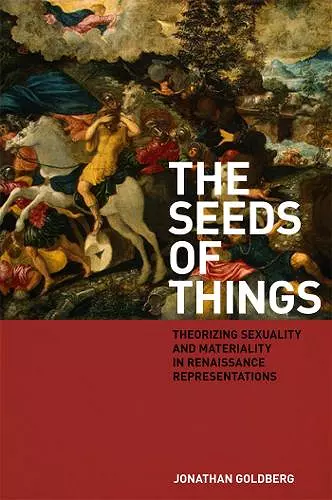Musically Sublime
Indeterminacy, Infinity, Irresolvability
Kiene Brillenburg Wurth author
Format:Paperback
Publisher:Fordham University Press
Published:14th Mar '12
Currently unavailable, and unfortunately no date known when it will be back
This paperback is available in another edition too:
- Hardback£66.00(9780823230631)

Musically Sublime rewrites musically the history and philosophy of the sublime. Music enables us to reconsider the traditional course of sublime feeling on a track from pain to pleasure. Resisting the notion that there is a single format for sublime feeling, Wurth shows how, from the mid eighteenth century onward, sublime feeling is, instead, constantly rearticulated in a complex interaction with musicality.
Wurth takes as her point of departure Immanuel Kant's Critique of Judgment and Jean-François Lyotard's aesthetic writings of the 1980s and 1990s. Kant framed the sublime narratively as an epic of self-transcendence. By contrast, Lyotard sought to substitute open immanence for Kantian transcendence, yet he failed to deconstruct the Kantian epic. The book performs this deconstruction by juxtaposing eighteenth- and nineteenth-century conceptions of the infinite, Sehnsucht, the divided self, and unconscious drives with contemporary readings of instrumental music.
Critically assessing Edmund Burke, James Usher, E.T.A. Hoffmann, Novalis, Friedrich Hölderlin, Arthur Schopenhauer, Richard Wagner, and Friedrich Nietzsche, this book re-presents the sublime as a feeling that defers resolution and hangs suspended between pain and pleasure. Musically Sublime rewrites the mathematical sublime as différance, while it redresses the dynamical sublime as trauma: unending, undetermined, unresolved.
Whereas most musicological studies in this area have focused on traces of the Kantian sublime in Handel, Haydn, and Beethoven, this book calls on the nineteenth-century theorist Arthur Seidl to analyze the sublime of, rather than in, music. It does so by invoking Seidl's concept of formwidrigkeit ("form-contrariness") in juxtaposition with Romantic piano music, (post)modernist musical minimalisms, and Lyotard's postmodern sublime. It presents a sublime of matter, rather than form-performative rather than representational. In doing so, Musically Sublime shows that the binary distinction Lyotard posits between the postmodern and romantic sublime is finally untenable.
"Contemporary philosophy is badly in need of a new philosophical vocabulary enabling it to shed new light on old problems. This book proves clear that no notion will be more successful here than that of the sublime. And that the sublime is best exemplified by the experience of music. Kiene Brillenburg Wurth wrote a superior book on a fascinating theme. Her book will be landmark in contemporary philosophy." -- -Frank Ankersmit University of Groningen "An excellent textbook on the complex history of the philosophical sublime and an innovative rethinking of musical aesthetics." -- -Peter Szendy University of Paris X, Nanterre "Analyzing critical and philosophical writing from the mid-eighteenth century on, Wurth moves from Burke through Kant and Schopenhauer to Lyotard to posit a complex, multifaceted notion of the sublime, citing music as its crucial source." -- -Annette Richards Cornell University "Wurth does better than merely document the history of the sublime in music. By engaging with the term in its various incarnations, she offers the reader a full sense of the complexities of the term, the scope of various theories, and finally, offers a strong theory of the postmodern sublime." -- -Benjamin Downs Music Research Forum "In the history of Western aesthetics, the beautiful and the sublime have maintained an antipodal relationship: beauty is pleasing and sublime is overpowering, with the former in a dominant position. During the 18th century that position changed because instrumental music became predominant and aestheticians increasingly noted its expressive qualities. The sonata, symphony, and many other purely instrumental forms were expanding rapidly. Without an accompanying text, this music seemed "meaningless" yet full of expressive features. For much music, the sublime might be a more adequate definition if one could expand and enhance its definition. Wurth (comparative literature, Univ. of Utrecht) traces the changing concept of sublime beginning with its classical use in pseudo-Longinus; continuing to important treatises by Edmund Burke, Immanuel Kant, Arthur Schopenhauer, Richard Wagner, Freidrich Nietzsche, Arthur Seidl, et al.; and on to the work of postmodernist philosopher Jean-Francois Lyotard. The author presents her own theory of the sublime, using subtexts--"indeterminacy," "infinite," "irresolvability"--as guideposts not only to analysis of today's postmodern music but to music of the late-18th and particularly the 19th century. Readers should have some background in philosophy and music aesthetics to understand this study, which unfortunately lacks an index. Summing Up: Recommended. With reservations. Graduate students, researchers." -Choice "Juxtaposes analysis of instrumental music against 18th-and 19th-century ideas of the infinite, the divided self, and unconscious drives." -The Chronicle of Higher Education
ISBN: 9780823230648
Dimensions: unknown
Weight: unknown
234 pages